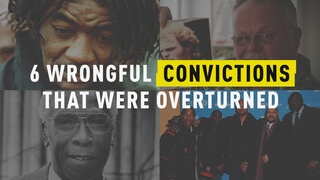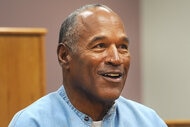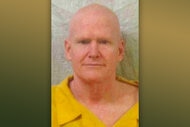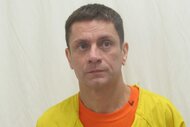Create a free profile to get unlimited access to exclusive videos, breaking news, sweepstakes, and more!
After Two Decades In Jail, Two Men Convicted Of 'Satanic' Killings Get Their Murder Charges Dismissed
Garr Hardin and Jeffrey Clark were convicted of killing Rhonda Sue Warford in 1992. Police said her death was part of a satanic ritual. Oxygen spoke to one of their Innocence Project lawyers.

Imagine losing two decades of your life because of a modern-day witch-hunt.
"Satanic Panic" was real and alive in America in the 1980s and 90s, especially in the country's bible belt. It seemed that anyone that didn't fit in could be pigeonholed as Satan worshippers and accused of murder. It happened to the "West Memphis Three." That's also exactly what happened to Garr Keith Hardin and Jeffrey Dewayne Clark, who only finally got their names cleared.
On Monday, a Kentucky judge dismissed murder charges against the two men who were convicted of the 1992 murder of 19-year-old Rhonda Sue Warford. Police had deemed her brutal stabbing a “satanic” killing. Hardin and Clark were released in 2016 after their convictions were vacated. Now, the murder charges have been dismissed against the men completely, the Associated Press reports.
The Innocence Project played a pivotal role in getting the two men, now in their forties, freed. Seema Saifee, the Innocence Project staff attorney who represented Hardin, spoke to Oxygen about the process. She said that Hardin wrote to The Innocence Project.
“He said he was innocent,” Saifee told Oxygen, “ and he talked about the evidence against him. DNA wasn’t available at the time of his trial. Every single thing he said checked out.”
For years, The Innocence Project tried to get post-conviction DNA testing with the consent of the prosecutor’s office. It was a struggle. Saifee, who began working on the case in 2012, said the prosecutor’s office did not agree to the test, which The Innocence Project offered to pay for. Both The Innocence Project and The Kentucky Innocence Project (who represented Clark) appealed and it went all the way up to the Kentucky Supreme Court. At the time, the prosecution was still fighting the DNA test.
“One of the supreme court justices of Kentucky looked directly at a prosecutor and asked, ‘why won’t you just give them a test?’” Saifee reflected. “Kentucky Supreme Court granted the testing.”
The testing, granted in 2013, ended up proving that the two men were innocent. Hairs on the murder victim were sent for DNA testing.
“Every single hair that could be tested that was found on the victim’s body, including the hair that was said to be a microscopic match to Mr. Hardin was conclusively determined from DNA testing not to have come from Hardin or Clark. So, the evidence used to convict them had been proven false.”
That wasn’t the only piece of evidence used against them that was recently shot down.
“There was also some blood that was found in Mr. Hardin’s home that was on a cloth next to a glass and the Commonwealth argued that the glass was a chalice from which Hardin drank the blood of the animals he sacrificed for Satan because they claimed that these men were Satan worshippers. It’s sensational and frankly an absurd allegation.”
From the beginning, Hardin testified that he never killed anyone, human or otherwise. He said the blood was from when he cut himself after a glass broke. According to Saifee, he was called a liar during his murder trial in 1995. She said that DNA now proves the blood belonged to him and that his story checked out, after all.
Saifee said that Detective Mark Handy, who headed the investigation into the stabbing death of Warford, claimed that Hardin “used to be involved in Satanism and used to kill animals and that he got tired of that and decided he wanted to sacrifice a human being.”
She told Oxygen that her client never did any of that and instead, he was a typical young person who had some curiosity about the occult.
“He had a book on Satanism he got from the high school library,” she said. “This was a teenager who was doing teenage things and reading these books and meditating and had interest in heavy metal music as many others were in the 1980s and 1990s.”
Saifee said that Handy has been connected with at least one other case where a suspect he helped convict was later proven innocent. She believes that there may be more.
Now a free man, Saifee said her client doesn’t harbor any anger for the 26 years he spent behind bars. She said he’s thrilled to be out.
“It was a travesty of justice,” Saifee said. “You would think that someone would be angry. He is just one of the nicest people I’ve ever known. He is trying to move on with his life, trying to find a good job, trying to find a way to make up for all those lost years which you really can’t make up for and no, he’s not angry. He’s hopeful.”
[Photo: Kentucky Department of Corrections]













